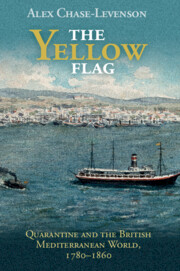Book contents
- The Yellow Flag
- Global Health Histories
- The Yellow Flag
- Copyright page
- Dedication
- Contents
- Figures
- Acknowledgments
- Note on the Text and Translations
- Introduction
- Part I Mediterranean Currents
- Part II Lazarettos, Health Boards, and the Building of a Biopolity
- Part III Imagining the Plague
- Part IV Old Patterns, New Cordons
- 8 Quarantine and Empire
- 9 Mutually Assured Deconstruction
- Conclusion: Plagueomania
- Bibliography
- Index
9 - Mutually Assured Deconstruction
from Part IV - Old Patterns, New Cordons
Published online by Cambridge University Press: 27 March 2020
- The Yellow Flag
- Global Health Histories
- The Yellow Flag
- Copyright page
- Dedication
- Contents
- Figures
- Acknowledgments
- Note on the Text and Translations
- Introduction
- Part I Mediterranean Currents
- Part II Lazarettos, Health Boards, and the Building of a Biopolity
- Part III Imagining the Plague
- Part IV Old Patterns, New Cordons
- 8 Quarantine and Empire
- 9 Mutually Assured Deconstruction
- Conclusion: Plagueomania
- Bibliography
- Index
Summary
In the 1850s, the character of Mediterranean quarantine fundamentally changed when it lost its role as a universal barrier. This chapter explores both the end of the universal quarantine system in the Mediterranean and its influential afterlife. It was because of the tight links among boards of health that governments conceived of an international medical conference as the only way quarantine could be reformed. The first such International Sanitary Conference (1851) is widely recognized as an influential moment in the creation of the idea of international health. After 1851, though quarantine remained a tool within a later medical and political arsenal, it was no longer a universal European checkpoint against all arrivals from a specific region of the world. The chapter shows that the end of the system of mandatory quarantine had at least as much to do with the decline of plague in the Middle East as it did with the ascent of anticontagionist arguments in London, Madrid, Paris, or Vienna. Universal quarantine set down geographies of exclusion that have proven enduring. Yet, in global terms, it was primarily after the end of this universality, in the later nineteenth century, that quarantine effectively became a tool for targeting specific individuals, races, and ethnicities.
Keywords
Information
- Type
- Chapter
- Information
- The Yellow FlagQuarantine and the British Mediterranean World, 1780–1860, pp. 244 - 277Publisher: Cambridge University PressPrint publication year: 2020
